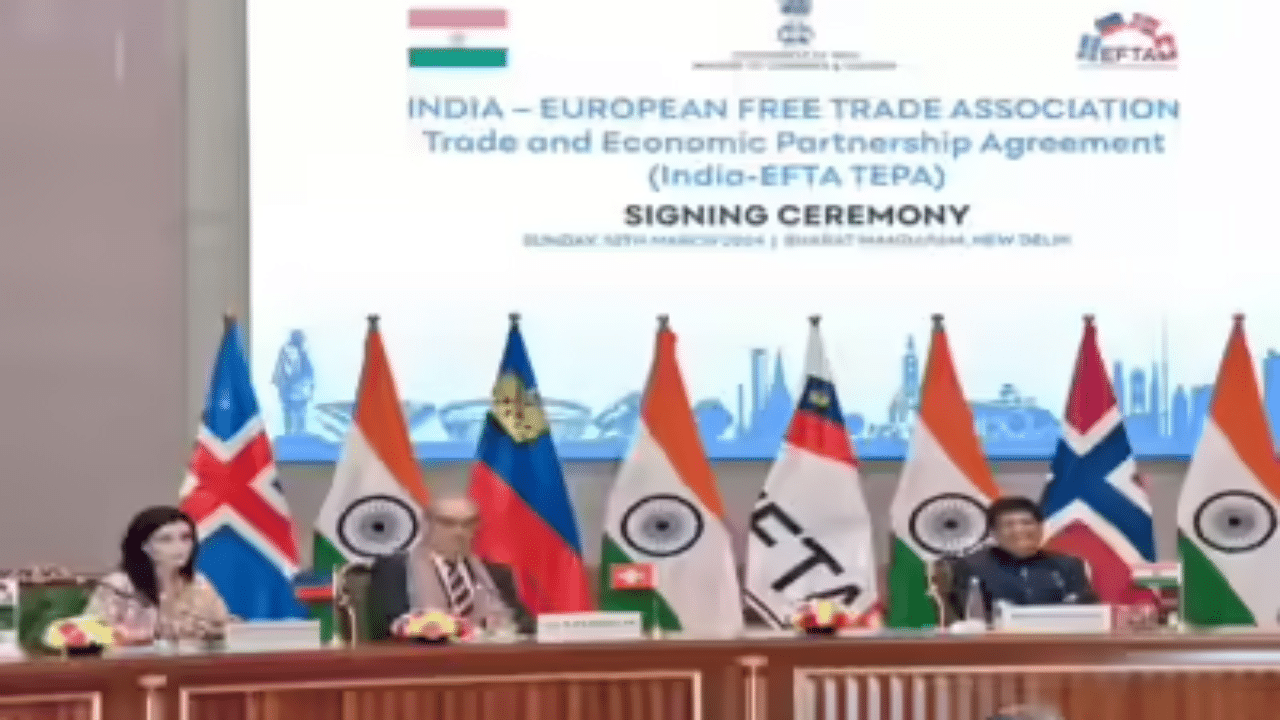Switzerland Approves Trade Agreement with India and EFTA

Switzerland has officially ratified the India-EFTA Trade and Economic Partnership Agreement (TEPA), marking a significant step in enhancing economic ties between India and the four EFTA member states: Iceland, Liechtenstein, Norway, and Switzerland. The agreement, which was signed in March after nearly 16 years of negotiations, is set to take effect in October. Swiss Ambassador to India, Maya Tissafi, described the ratification as a “significant milestone,” predicting it will unlock $100 billion in investments and create one million jobs in India over the next 15 years.
Details of the Agreement
The TEPA aims to reduce trade barriers and improve investment flows between India and the EFTA countries. With the ratification completed, the agreement is expected to facilitate long-term cooperation across various sectors. Tissafi emphasized that the TEPA will not only lower tariffs but also streamline customs procedures and enhance protections for intellectual property. Additionally, it will establish a framework for sustainable trade practices. The Swiss government is committed to implementing the agreement effectively to benefit Swiss companies looking to invest in India.
The ratification process included a referendum deadline that expired without any opposition, indicating the Swiss public’s tacit approval of the agreement. Tissafi noted that Iceland, Liechtenstein, and Norway have already ratified the TEPA, further solidifying the collaborative framework between these nations and India.
Investment Opportunities and Economic Impact
The TEPA is projected to significantly boost investments, with Tissafi estimating that it could lead to $100 billion in new investments in India over the next 15 years. Currently, Switzerland ranks as the 12th-largest investor in India, with investments increasing from CHF 551 million in 2000 to CHF 10 billion in 2024. More than 330 Swiss companies operate in India, spanning sectors such as engineering, pharmaceuticals, and chemicals. Conversely, Indian firms are also active in Switzerland, particularly in IT and machinery.
While the agreement will take effect in October, Tissafi mentioned that certain categories of goods will undergo progressive dismantling periods, which may extend up to 10 years. This gradual approach aims to balance the interests of both parties while fostering a conducive environment for trade.
Broader Bilateral Relations
The TEPA is part of a broader framework of cooperation that has developed between Switzerland and India over the past 77 years since the signing of the Treaty of Friendship. Tissafi highlighted the multifaceted nature of their partnership, which encompasses diplomacy, trade, education, and climate change initiatives. Recent efforts include the launch of the Swiss-Indian Innovation Platform in Bengaluru, designed to foster collaboration between Indian Institutes of Technology (IITs) and Swiss universities, as well as top companies from both nations.
This platform aims to build strategic innovation collaborations, further enhancing the bilateral relationship. Tissafi’s remarks underscore the commitment of both countries to deepen their ties across various sectors, paving the way for future growth and cooperation.
Future Prospects
As Switzerland prepares to implement the TEPA, the focus will be on maximizing the benefits for both Swiss and Indian businesses. The establishment of the EFTA Desk in February is one initiative aimed at facilitating investments from EFTA countries into India. Tissafi expressed optimism about the potential for increased collaboration, stating that the TEPA will create a more favorable environment for trade and investment.
With the agreement set to take effect in October, both countries are poised to embark on a new chapter in their economic relationship. The TEPA not only represents a significant achievement in trade negotiations but also lays the groundwork for sustainable growth and cooperation in the years to come.
Observer Voice is the one stop site for National, International news, Sports, Editor’s Choice, Art/culture contents, Quotes and much more. We also cover historical contents. Historical contents includes World History, Indian History, and what happened today. The website also covers Entertainment across the India and World.
Follow Us on Twitter, Instagram, Facebook, & LinkedIn

